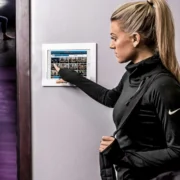Fitness business expert Jessica Maurer explains how personal branding, niche expertise and emotional connections are the keys to success in the upcoming year
As the fitness industry continues to grow and change year over year, so too should a fitness professional’s approach to marketing and promotion. With so many recent shifts in consumer priorities — particularly toward mental well-being and intuitive movement — alongside the swift advancements in technology and social media, there’s no shortage of new challenges and opportunities.
To provide valuable insight on navigating this landscape, Athletech News turned to Jessica H. Maurer, a leading fitness business consultant and strategist. With her extensive experience helping businesses grow, her work spans instructor development, brand transformation and creating joyful wellness journeys. Maurer shares her advice on connecting with audiences, building personal brands and standing out in an industry that has never been more competitive.
Athletech News (ATN): What do you see as the biggest shift in how fitness professionals should market themselves in 2025 compared to previous years?
Jessica Maurer (JM): We must leave the world of sets and reps behind. Consumers are working out for their mental well-being, and we must embrace that motivation and lean into it. Fitness professionals should focus on marketing the immediate gratification of a single workout — the endorphin rush, the mental clarity, and the confidence boost — and leave behind the story of 8-week weight loss.’
In 2025, the shift will be about connecting with the emotional and psychological benefits of movement, meeting people where they are and helping them leave each session feeling better than when they arrived. Highlight how your classes or services provide instant wins that enhance mental resilience, mood and overall quality of life.
ATN: How important is personal branding for fitness pros, and what are the key components of an effective brand?
JM: Many people were hurt physically or emotionally by the “no pain, no gain” mentality that fitness held for many years. While this old story may have represented pre-pandemic gyms, it is still widely believed in the consumer world. We have to work to rebrand the entire industry as one of support, intuitive movement and expertise.
Because of this, I believe education and niche expertise will be huge components of a fitness professional’s branding moving forward. Consumers want to know their fitness professionals understand their unique pain points and see the consumer as an individual — not a “lump sum.” The fitness professional appropriate for a 25-year-old may not be the right choice for a woman in her 50s or a male in his 80s. Decide who you want to serve, then dig deep into that demographic’s needs, wants and challenges.
ATN: Which social media platforms should fitness professionals prioritize in 2025, and how can they effectively engage their audience?
JM: The platform itself is not important. Instead, the focus should be on how you use the platform. Social media isn’t just a coffee shop bulletin board – you cannot just post a flyer and then leave. You have to be social on the platform of your choice.
Schedule 15 minutes daily to focus on the 3 Cs – connection, community and camaraderie. Comment on other posts. Share content from other accounts. Interact with your leads and customers. Be social (engage).
ATN: What types of content resonate most with potential clients and how can fitness pros stand out?
JM: Set yourself apart from others by highlighting your expertise. You are not Super Target. You are not going to make everyone happy. Instead, focus on what you do really well and the people you want to work within your business. Hone your knowledge and skills to demonstrate that you understand your target demographic’s needs, wants and challenges.
Then, discuss these aspects with your audience. Share how you are continually learning about menopause to better support your clients. Mention the workshops you’re taking on improving balance and reducing fall risks. Be vocal about your ongoing education efforts to better serve your audience.
ATN: How can fitness professionals define and connect with their ideal audience in 2025, especially as trends evolve?
JM: Do you remember a time before social media? Believe it or not, businesses survived and thrived before Facebook was a staple.
To truly connect with your audience, interact with them in person. Become the Mayor of Wellness in your city by making your name — and your business — known to everyone. Join the Chamber of Commerce, participate in community events, or sponsor a Little League team. Get out there and meet people while proudly representing your brand
ATN: What are some common marketing mistakes you see fitness professionals making, and how can they avoid them?
JM: If you are a dance studio owner or instructor, you should learn the latest TikTok dance craze. If you are not, you should skip it.
In other words, be wary of fads and trends. Remember to speak directly to your audience to share your knowledge and expertise. Consumers want to see that you are authentic to your mission and yourself.
It’s a common mistake for fitness professionals to not show real clients.. Stock images and photos of yourself are great to get you started or when in a pinch, but consumers are more likely to trust others who look like themselves. Show your leads that you are helping and supporting people just like them.
ATN: What advice would you give to fitness professionals to future-proof their marketing strategies and stay relevant beyond 2025?
JM: Fitness professionals should stop focusing on what they can personally do. Instead, we should be focusing on what our target demographic can do. Focus your marketing efforts on how successful your customers are at accomplishing their goals or strengthening their resilience and willpower.
Remember, the goal is to convince the market to know, like and trust that you are the expert in the field. Without that level of trust, consumers will not purchase from you. Win them over by demonstrating how you can be their trusted ally on their wellness journey.









:max_bytes(150000):strip_icc()/tal-11-holiday-gifts-not-to-buy-travelers--and-what-to-surprise-them-with-instead--tout-eb07133011b04ca199b667fd2d21a034.jpg)


